英国国际酒店与旅游管理课程中英文对照
星级酒店培训纲要中英文对照

星级酒店培训纲要中英文对照星级酒店培训纲要中英文对照Star Hotel Training Outline1.员工礼仪1. Employee etiquette员工礼仪是星级酒店服务的重要组成部分,良好的礼仪能为顾客提供良好的服务。
员工礼仪包括形象、言语、动作等方面。
Employee etiquette is an important part of star hotel service. Good etiquette can provide good service for customers. Employee etiquette includes image, language, movement and other aspects.2.服务技能2. Service skills服务技能是星级酒店服务中必不可少的一部分,包括技巧、知识、细节等方面。
服务技能是提高顾客体验和提升酒店服务质量的重要手段。
Service skills are an indispensable part of star hotel service, including skills, knowledge, details and other aspects. Service skills are important means to improve customer experience and enhance hotel service quality.3.预定管理3. Reservation management预定管理是星级酒店运营中重要的一环,包括预订、预付款、预付订金、修改和取消预定等方面。
良好的预定管理可以提高酒店的营收和满意度。
Reservation management is an important part of star hotel operation, including booking,prepayment, pre-deposit, modification and cancellation of reservation and other aspects. Good reservation management can improve the hotel's revenue and satisfaction.4.前台接待4. Reception of front desk前台接待是星级酒店服务的第一道防线,包括前台接待和处理客人问题等方面。
CBU 酒店与旅游管理详细资料
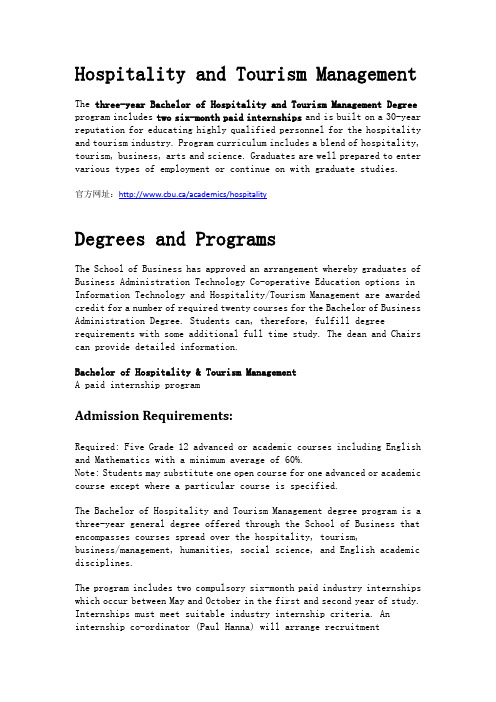
Hospitality and Tourism ManagementThe three-year Bachelor of Hospitality and Tourism Management Degree program includes two six-month paid internships and is built on a 30-year reputation for educating highly qualified personnel for the hospitality and tourism industry. Program curriculum includes a blend of hospitality, tourism, business, arts and science. Graduates are well prepared to enter various types of employment or continue on with graduate studies.官方网址:http://www.cbu.ca/academics/hospitalityDegrees and ProgramsThe School of Business has approved an arrangement whereby graduates of Business Administration Technology Co-operative Education options in Information Technology and Hospitality/Tourism Management are awarded credit for a number of required twenty courses for the Bachelor of Business Administration Degree. Students can, therefore, fulfill degree requirements with some additional full time study. The dean and Chairs can provide detailed information.Bachelor of Hospitality & Tourism ManagementA paid internship programAdmission Requirements:Required: Five Grade 12 advanced or academic courses including English and Mathematics with a minimum average of 60%.Note: Students may substitute one open course for one advanced or academic course except where a particular course is specified.The Bachelor of Hospitality and Tourism Management degree program is a three-year general degree offered through the School of Business that encompasses courses spread over the hospitality, tourism,business/management, humanities, social science, and English academic disciplines.The program includes two compulsory six-month paid industry internships which occur between May and October in the first and second year of study. Internships must meet suitable industry internship criteria. An internship co-ordinator (Paul Hanna) will arrange recruitmentpresentations and provide students with the opportunity to be interviewed on campus by national, provincial, and regional establishments for internship placement. Students are also encouraged to seek internship opportunities on their own, although all eligible internship placements are subject to approval by the Internship Co-ordinator.Academic terms 3 and 5 begin in mid-October allowing time for students to complete the 540 hours of approved industry employment required to fulfill the industry internship component of the program.Students should consult an academic advisor about appropriate electives.Program courses are spread across the hospitality/tourism(industry-specific), business (management) and non-business (liberal education) disciplines as follows:For detailed information, see the Academic Calendar (pdf) Curriculum:Year 1Fall Term (September-December) Winter Term (January-April)∙HATM 161 Introduction To Food Theory and Nutrition∙HATM 169 Guest Service Computer Applications∙100 level Humanities∙100 level English∙* 100 level Social Science ∙HATM 165 Hospitality/Tourism in Canada∙HATM 162 Restaurant Operation and Service∙100 level Humanities∙100 level English∙* 100 level Social Science* Science, Social Science or Natural ScienceSpring/Summer: Hospitality & Tourism Internship IYear 2Fall Term (October-December) Winter Term (January-April)∙HATM 268 Food Science Fundamentals for Hospitality Food Service Managers ∙HATM 361 Tourism Marketing∙HATM 367 Resort/FacilitiesManagement and Maintenance∙COMM 103 InterpersonalCommunication∙ECON 101 Principles of Microeconomics ∙HATM 269 Industry Internship I ∙HATM 365 Meetings and Convention Management∙BUSS 121 Financial Accounting∙COMM 105 Introduction to Public Communication∙MATH 151 Descriptive and BasicInferential Statistics∙ELECTIVE 200 level Humanities, English, or Social ScienceSpring/Summer: Hospitality & Tourism Internship IIYear 3Fall Term (October-December) Winter Term (January-April)∙HATM 370 Functions Management I∙HATM 368 Hospitality/Tourism Law∙BUSS 493 Tourism Management I∙ECON 102 Principles ofMacroeconomics∙BUSS 261 Introduction to Organizational Behaviour∙HATM 369 Advanced IndustryInternship II ∙BUSS 495 Tourism Strategy∙HATM 371 Functions Management II ∙BUSS 122 Financial Accounting II∙ELECTIVE 200 level or higherHumanities, English, or Social Science ∙ELECTIVE 200 level or higherHumanities, English, or Social Science2010 至2011 年度国际学生费用计算示例学费$11,320 – 11,470*保险费650住宿费3,530 – 5,400膳食费300 – 3,700合计$15,800 – 21,220国际学生本科费用ACADEMIC FEES 2011-2012Other Academic Fees。
萨里大学国际酒店与旅游管理
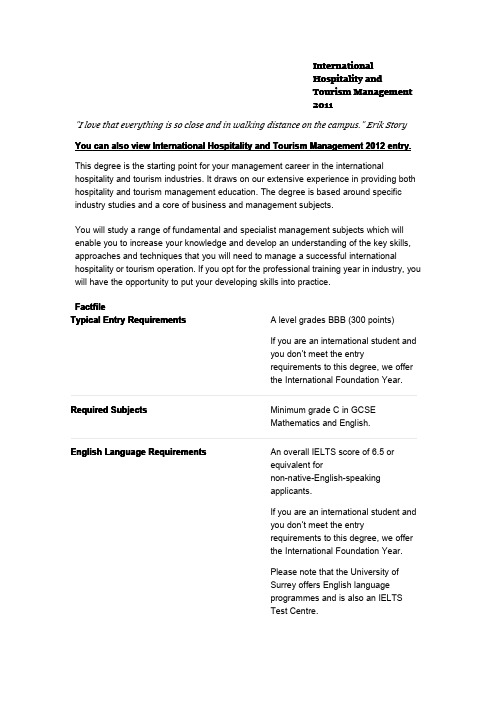
InternationalHospitality andTourism Management2011"I love that everything is so close and in walking distance on the campus."Erik Story You can also view International Hospitality and Tourism Management2012entry.This degree is the starting point for your management career in the international hospitality and tourism industries.It draws on our extensive experience in providing both hospitality and tourism management education.The degree is based around specific industry studies and a core of business and management subjects.You will study a range of fundamental and specialist management subjects which will enable you to increase your knowledge and develop an understanding of the key skills, approaches and techniques that you will need to manage a successful international hospitality or tourism operation.If you opt for the professional training year in industry,you will have the opportunity to put your developing skills into practice.Degree Programme BSc(Hons)DegreeProgrammeProgramme OverviewThe programme consists of compulsory and elective modules which you study to earn credits towards your final degree.You will study for120credits per level.At Level1all modules are compulsory and languages can be studied as optional elective modules.The compulsory modules will enable you to develop fundamental and international hospitality and tourism-specific management skills and knowledge.The hospitality-specific compulsory module,The Hospitality Business,provides you with a strong working knowledge of the international hospitality industry.You will be able to identify,analyse and evaluate the key issues that need to be addressed within the industry.The tourism-specific compulsory module,Business of Tourism,enables you to identify the principal components involved in the study and understanding of tourism,and it offers you a general introduction to the main tourism industry sectors:accommodation,transport,attractions and the travel trade.At Level2and Level3you will study a combination of compulsory modules based on fundamental management topics,and international hospitality and tourism-specific management topics.You will be able to choose from a wide selection of elective modules based on a variety of management topics including business,entrepreneurship,finance and retail,together with hospitality and tourism.Level3also provides the opportunity for you to undertake a final-year project consisting of detailed research in your particular field of interest.Programme StructureLevel1Compulsory modules:•Management Skills•Business Environment•Marketing Principles•Introductory Accounting•The Hospitality Business•Business of TourismPlus elective language modulesLevel2Compulsory modules:•Business Skills•Managing Organisations and Human Resources•Managing the Hospitality Business•Sustainable TourismPlus elective modulesLevel P•Optional professional training yearLevel3Compulsory modules:•Business Strategy•Final-year Project•International Tourism Destinations•Strategic Analysis of Hospitality CompaniesPlus elective modulesDetails of the elective modules are available online: /ugmodulematrix.更多资料:UCAS中国www.ucas.hk。
《旅游接待业(全英)》-课程教学大纲

《旅游接待业Introduction to Hospitality》课程教学大纲一、课程基本信息课程代码:20080092课程名称:旅游接待业(全英)英文名称:Introduction to Hospitality课程类别:专业课学时:32学分:2适用对象:旅游管理(中外人才培养实验班)考核方式:考试先修课程:无二、课程简介This course provides an understanding of Tourism, Hospitality and Events as separate fields of study and the interrelationship between them all. It looks at the role of THE in society, its involvement with industry and government and its impact on the environment. Tourism, hospitality and events are often viewed as almost separate industries/activities and university degree programs. However, this course is designed to study the inter-relationships that exist between these industries and to demonstrate how they fit into the wider industrial and social landscapes.Given the increasing trend towards globalization, both socially and economically, the course will take a global perspective of these industries/activities to exemplify how they are related to, and influence the nature of, one another.As a result of this course, students should recognize that although they may be focusing their studies on one particular industry/activity they need to take into account all the others in order to fully understand their chosen area of expertise.三、课程性质与教学目的This course aims for students to develop their knowledge and understanding of the industries/activities of tourism, hospitality and events. In particular students should have aclear understanding of the sectors of these industries/activities and the inter-relationships that exist between them.After successfully completing this course you should be able to:1.clearly define tourism, hospitality and event management;prehend and report on the inter-related nature of tourism, hospitality and events;3.understand and explain the concepts, evolution and impacts of tourism, hospitality andevents globally;4.work with peers to synthesise and communicate information on a particular topic fromthe body of knowledge on tourism, hospitality, and events;5.demonstrate academic literacy and ethical scholarship, and appreciate how this appliesto future studies;pare tourism and hospitality industries in China and globally, especially theroles of different actors and management/government principles in different countrie s.四、教学内容及要求Chapter 1 Introducing Hospitality1.Learning Objectives1.1Discuss the history of hospitality through the ages.1.2Describe the characteristics of the hospitality industry.1.3Explain corporate philosophy and total Quality Management.1.4Discuss the many facets of service and why it has become such an important part ofthe hospitality industry.1.5Suggest ways to improve service.1.6Discuss current trends in the hospitality industry.2.Contents2.1Hospitality through the ages.2.2The interrelated nature of hospitality and tourism.2.3Characteristics of the hospitality industry.2.4Sustainable hospitality.2.5Trends in hospitality and tourism.3.Review and Discussion3.1Compare and contrast the characteristics of the hospitality industry in relation to thetourism industry.3.2Identify the corporate philosophy of the global hospitality industry.3.3Assess the importance of Total Quality Management in the global hotel industry.3.4What is the difference between Total Quality Management and quality control?3.5Describe the history of the global hospitality industry.3.6Apart from sustainability and green travel, discuss two key trends in hospitality andtourism.4.Teaching MethodsLecture, Online resources application.Chapter 2 The Hotel Business1.Learning Objectives1.1Describe hotel ownership and development via hotel franchising and managementcontracts.1.2Explain the diamond rating classification of hotels.1.3Classify hotels by rating system type, location, and price.1.4Discuss the concept and growth of vacation ownership.1.5Discuss sustainable/green lodging.1.6Identify trends influencing the hotel business.2.Contents2.1Hotel development and ownership2.2Classification of hotels and lodging properties2.3International perspectives2.4Sustainable or green lodging2.5Trends in hotel development and management3.Review and Discussion3.1Why do you think an entrepreneur would choose to purchase a hotel instead ofacquiring a franchise?3.2Evaluate the importance of various hotel rating systems.3.3Critically assess the trends that you feel will have the biggest impact on the futureof the global hospitality industry.4.Teaching MethodsLecture, Online resources application.Chapter 3 Rooms Division1.Learning Objectives1.1Outline the duties and responsibilities of key executives and department heads.1.2Draw an organizational chart of the rooms division of a hotel and identify theexecutive committee members.1.3Describe the main functions of the rooms division departments.1.4Describe property management systems and discuss yield management.1.5Calculate occupancy percentages, average daily rates, and actual percentage ofpotential rooms revenue.1.6Outline the importance of the reservations and guest services functions.1.7List the complexities and challenges of the concierge, housekeeping, andsecurity/loss prevention departments.2.Contents2.1 The functions and departments of a hotel2.2Management structure and roles of departments2.3 Security/loss prevention2.4 Trends in hotel development and management3.Review and Discussion3.1Briefly define the purpose of a hotel. Why is it important to empathize with theculture of guests?3.2List the main responsibilities of the front- office manager.3.3What are the benefits of using a central reservation system?3.4Why is the concierge an essential part of the personality of a hotel?3.5Explain the importance of accident and loss prevention. What security measures aretaken to protect guests and their property?4.Teaching MethodsLecture, Online resources application.Chapter 4 Food and Beverage1.Learning Objectives1.1Describe the duties and responsibilities of a food and beverage director and otherkey department heads.1.2Describe a typical food and beverage director’s day.1.3State the functions and responsibilities of the food and beverage departments.1.4Perform computations using key food and beverage operating ratios.2.Contents2.1 Food and beverage management2.2 Kitchen2.3 Stewarding department2.4 Catering department2.5 Sustainable wine production2.6 Sustainable brewing2.7 Trends in the beverage industry3.Review and Discussion3.1Briefly describe the challenges a food and beverage director faces on a daily basis.3.2List the measures used to determine the food and beverage department’s profit andloss.3.3Explain the problems a hotel faces in making the following departments profitable:restaurants, bars, and room service.3.4Explain the importance of the catering department for a hotel and list theresponsibilities of a catering sales manager (CSM).4.Teaching MethodsLecture, Online resources application.Chapter 5 The Restaurant Business and Management1.Learning Objectives1.1Describe a restaurant’s front of the house.1.2Explain how restaurants forecast their business.1.3Describe restaurant service.1.4Describe front- and back-of-the-house systems.1.5Outline back-of-the-house operations.1.6Summarize restaurant management financials.2.Contents2.1 The restaurant business2.2 Franchises2.3 Sustainable restaurant operations2.4 Back-of-the-house operation2.5 Restaurant management financials2.6 Trends in the restaurant industry3.Review and Discussion3.1Most restaurants forecast a budget on a weekly and monthly basis, one that projectssales and costs for a year in consideration of guest counts and the average guest check.3.2To operate a restaurant, products need to be purchased, received, and properlystored.3.3Food production is determined by the expected business for the next few days. Thekitchen layout is designed according to the sales forecasted.3.4Good service is very important. In addition to taking orders, servers act assalespersons for the restaurant.3.5The front of the house deals with the part of the restaurant having direct contactwith guests, in other words, what the guests see—grounds maintenance, hosts/ hostesses, dining and bar areas, bartenders, bussers, and so on.3.6The back of the house is generally run by the food service/kitchen manager, andrefers to those functional areas and tasks with which guests usually do not come in contact. This includes purchasing, receiving, storing/issuing, food production, stewarding, budgeting, accounting, and control.4.Teaching MethodsLecture, Online resources application.Chapter 6 Tourism and managed services1.Learning Objectives1.1Summarize the historical impact of transportation on tourism.1.2Define tourism and describe the important international tourism organizations.1.3Describe the benefits and prospects of tourism.1.4Describe the economic impact of tourism.1.5Identify the promoters of tourism.1.6Summarize the sociocultural impact of tourism.1.7Describe ecotourism.2.Contents2.1 The historical impact of transportation on tourism2.2 What is tourism in the 21st century?2.3 The economic, social and cultural impact of tourism2.4 Ecotourism2.5 Sustainable tourism2.6Cultural, heritage, nature, and volunteer tourism2.7Trends in tourism and travel3.Review and Discussion3.1Give a broad definition of tourism and explain why people are motivated to travel.3.2explain the objectives of the UNWTO. What are the characteristics of the travel andtourism industry according to the UNWTO and the WTTC?3.3Choose a career in the tourism business and give a brief overview of what yourresponsibilities would be.3.4Discuss the positive and negative impacts that tourism can have on a country inrelation to tourism pollution and ecotourism.4.Teaching MethodsLecture, Online resources application.Chapter 7 Recreation, Attractions, and Clubs1.Learning Objectives1.1Discuss the relationship of recreation and leisure to wellness.1.2Explain the origins and extent of government-sponsored recreation.1.3Distinguish between commercial and noncommercial recreation.1.4Identify different types of major attractions in China and globally.2.Contents2.1 Recreation, leisure and wellness2.2 Government-sponsored recreation3.2Commercial recreation attractions3.3Managing attractions3.4Noncommercial recreation2.6 Trends in recreation and leisure3.Review and Discussion3.1Define recreation and its importance to human wellness. What factors affect anindividual’s decision to participate in recreational activities?3.2Describe three recreation activities that are sponsored by the Chinesegovernment and identify the superiority of the socialist system.3.3Briefly describe the difference between commercial and noncommercial recreation.4.Teaching MethodsLecture, Online resources applicationChapter 8 Gaming Entertainment1.Learning Objectives1.1Outline the history of modern casinos.1.2Describe the various components of modern casino hotels.1.3Explain how casinos have been integrated into larger hospitality operations.1.4Understand the basic principles of casino operations.1.5Discuss the different positions within the gaming industry.2.Contents2.1 Historical review of gaming entertainment2.2Case of Macau2.3Working in a casino resort2.4Sustainability in gaming entertainment2.5Trends in the gaming entertainment industry3.Review and Discussion3.1What defines a gaming entertainment business?3.2Explain the attraction of gaming entertainment as a tourist.3.3Why is it necessary for strict regulations to be in force on the casino floor?3.4How are hotel operations in a gaming entertainment business different from hoteloperations in a nongaming environment?4.Teaching MethodsLecture, Online resources applicationChapter 9 Meetings, Conventions and Expositions1.Learning Objectives1.1List the major players in the convention industry.1.2Describe destination management companies.1.3Describe the different aspects of being a meeting planner.1.4Explain the different types of meetings, conventions, and expositions.1.5List the various venues for meetings, conventions, and expositions.2.Contents2.1 Development of the meetings, conventions, and expositions industry2.2 Key players in the industry2.3 Types of meetings, conventions, and expositions2.4 Historical associations2.5 venues for meetings, conventions, and expositions1.6Sustainable meetings, conventions, and expositions2.6 Trends in meetings, conventions, and expositions3.Review and Discussion3.1Which new technologies are being used in meetings and conventions?3.2Why are cruise ships being increasingly used as venues for meetings?3.3Discuss the role and functions of a DMC.3.4Outline the format of a typical convention program.4.Teaching MethodsLecture, Online resources applicationChapter 10 Special Events1.Learning Objectives1.1Define a special event.1.2Describe what event planners do.1.3Classify special events.1.4Outline the skills and abilities required for event management.1.5Identify the main professional organizations and associations involved with thespecial events industry.2.Contents2.1 Classifications of special events2.2What event planners do2.3Required skills and abilities for event management2.4Special event organizations2.5Sustainability in special events2.6 Trends in the special events industry3.Review and Discussion3.1What are the responsibilities of an event planner?3.2What are the challenges for event planners and managers?3.3Describe three of the classifications of special events.3.4Describe what organizers should do for crisis management.4.Teaching MethodsLecture, Online resources applicationChapter 11 Leadership and Management1.Learning Objectives1.1Identify the characteristics and practices of leaders.1.2Define leadership.1.3Identify the characteristics and practices of management.1.4Define management.1.5Differentiate between leadership and management.1.6Discuss ethics in hospitality.2.Contents2.1 Leadership in hospitality management2.2Sustainable leadership2.3 Ethical dilemmas in hospitality2.4 Trends in leadership and management3.Review and Discussion3.1Give examples of the management functions as they apply to the hospitalityindustry.3.2Discuss the changing role of managers.3.3Define leadership and name the essential qualities of a good leader.4.Teaching MethodsLecture, Online resources application六、课程考核(一)考核方式考试(二)成绩构成平时成绩占比:40% 期末考试占比:60%(三)成绩考核标准1. Assessment:Presentation: Content (40%) + Structure (30%) + Oral Presentation (15%) + Aesthetics (15%)Reading Report: Content (40%) +Structure (30%) + Grammar (20%) + Aesthetics (10%)2. Class Attendance3. Finals七、推荐教材和教学参考资源1.Walker, J. R. (2017). Introduction to Hospitality (7th ed.). Prentice Hall.2.Ford, R.C., Sturman, M.C. & Heaton, C.P. (2012). Managing Quality Service inHospitality: How Organizations Achieve Excellence in the Guest Experience. Pages 14-17.3.Weaver, D. & Lawton, L. (2014). Tourism Management, 5th Ed. Pages 50-60.4.Walker, J.R. (2013). Introduction to Hospitality, 6th Ed. Pages 354-356.5.UNWTO. (2019). Tourism Highlights. https:///10.18111/97892844211526.Weaver, D. & Lawton, L. (2014). Tourism Management, 5th Ed. Pages 286-295.7.Ford, R.C., Sturman, M.C. & Heaton, C.P. (2012). Managing Quality Service inHospitality: How Organizations Achieve Excellence in the Guest Experience.lard, N. (2006). Learning from the ‘wow’ factor- how to engage customers throughthe design of effective affective customer experiences. BT Technology, 24(1), 11-16.9.Calahan, M. (2014). What do the words hospitality and customer service mean to you?10.Coussement, M.A., Tanyatanaboon, M., Li, Z., Shportko, A. & Miao, L. (2014). Astrategy of duality: New choreography for the Marriott/Ritz-Carlton dance. Journal of Hospitality & Tourism Cases.。
西英格兰大学国际旅游管理硕士
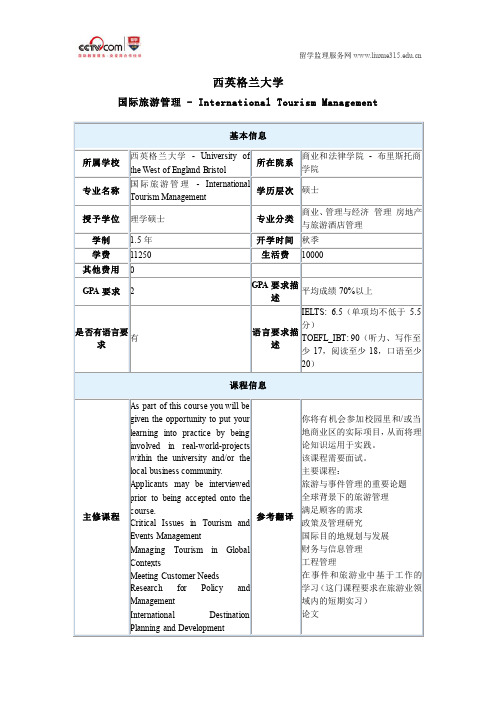
西英格兰大学国际旅游管理 - International Tourism Management西英格兰大学University of the West of England Bristol综合排名:62学校类型:公立- 综合性大学所在地:英国英格兰布里斯托录取率:暂无统计每年学费:8万(人民币)是否有奖学金:是在校生人数:30069开学时间:秋季学校网址:院校介绍院校简介西英格兰大学是英国最受欢迎的大学之一,有约30000名在校学生和3500位教职员工,其中有2636名来自140多个国家的国际留学生,是英格兰西南地区最大的高等教育机构。
虽然它是一所现代学校,但其渊源可追溯至1595年创办的一所航海学校。
400多年来,在英国大专院校重组过程中,不断融合了英国的多所学院,一直到1992年在高等教育法令下,成为西英格兰大学。
西英格兰大学位于历史悠久、景色优美的海滨城市布里斯托,该校优异的教学和研究也为这座城市的社会和经济发展做出了重要的贡献。
学校特有的毕业生发展项目重视与产业和公司的联接,为学生提供体验实际工作并培养职业技能的机会,增强了其毕业生在就业市场中的竞争力。
院系介绍西英格兰大学分为四个学院,分别是艺术、创意产业和教育学院,商业和法律学院,环境和技术学院以及健康和生命科学学院。
各大学院又可分为共17个系,设有600多个本科和研究生专业及32个研究中心。
课程涉及许多学科领域,如应用科学,艺术、传媒和设计,商科,环境营造,计算,工程和数学科学,教育,健康和社会保障,人文,语言和社会科学,法律。
教学水平优秀的学科包括艺术与设计、商业研究、交流与媒体研究、经济学、教育、英语、地产与物业管理、法律、生物学、护理、药剂学与药理学、心理学、社会学与社会政策、城镇规划。
学术实力在2012年TIMES英国大学排名中,西英格兰大学排在第67位。
2001年科研水平评估结果显示,西英格兰大学的会计与金融专业的科研水平被评为最高级别;2008年的RAE显示该校约三分之一的研究成果是“世界领先”或“国际优秀”。
著名国际五星级酒店培训教材大全中英对照
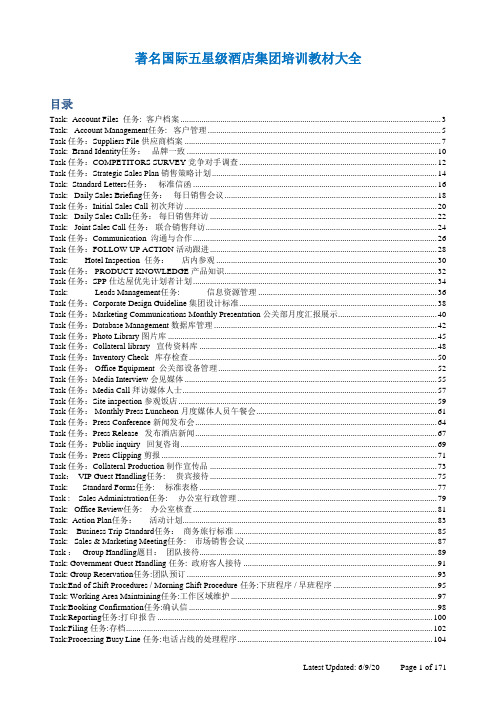
著名国际五星级酒店集团培训教材大全目录Task: Account Files 任务: 客户档案 (3)Task: Account Management任务: 客户管理 (5)Task 任务:Suppliers File 供应商档案 (7)Task: Brand Identity任务:品牌一致 (10)Task 任务:COMPETITORS SURVEY 竞争对手调查 (12)Task 任务:Strategic Sales Plan 销售策略计划 (14)Task: Standard Letters任务:标准信函 (16)Task: Daily Sales Briefing任务:每日销售会议 (18)Task 任务:Initial Sales Call 初次拜访 (20)Task: Daily Sales Calls任务:每日销售拜访 (22)Task: Joint Sales Call 任务:联合销售拜访 (24)Task 任务:Communication 沟通与合作 (26)Task 任务:FOLLOW UP ACTION 活动跟进 (28)Task: Hotel Inspection 任务:店内参观 (30)Task 任务: PRODUCT KNOWLEDGE 产品知识 (32)Task 任务:SPP 仕达屋优先计划者计划 (34)Task: Leads Management任务: 信息资源管理 (36)Task 任务:Corporate Design Guideline 集团设计标准 (38)Task 任务:Marketing Communications Monthly Presentation 公关部月度汇报展示 (40)Task 任务:Database Management 数据库管理 (42)Task 任务:Photo Library 图片库 (45)Task 任务:Collateral library 宣传资料库 (48)Task 任务:Inventory Check 库存检查 (50)Task 任务: Office Equipment 公关部设备管理 (52)Task 任务:Media Interview 会见媒体 (55)Task 任务:Media Call 拜访媒体人士 (57)Task 任务:Site inspection 参观饭店 (59)Task 任务: Monthly Press Luncheon 月度媒体人员午餐会 (61)Task 任务:Press Conference 新闻发布会 (64)Task 任务:Press Release 发布酒店新闻 (67)Task 任务:Public inquiry 回复咨询 (69)Task 任务:Press Clipping 剪报 (71)Task 任务:Collateral Production 制作宣传品 (73)Task: VIP Guest Handling任务: 贵宾接待 (75)Task: Standard Forms任务: 标准表格 (77)Task : Sales Administration任务: 办公室行政管理 (79)Task: Office Review任务: 办公室核查 (81)Task: Action Plan任务:活动计划 (83)Task: Business Trip Standard任务:商务旅行标准 (85)Task: Sales & Marketing Meeting任务: 市场销售会议 (87)Task : Group Handling题目:团队接待 (89)Task: Government Guest Handling 任务: 政府客人接待 (91)Task: Group Reservation任务:团队预订 (93)Task:End of Shift Procedures / Morning Shift Procedure 任务:下班程序 / 早班程序 (95)Task: Working Area Maintaining任务:工作区域维护 (97)Task:Booking Confirmation任务:确认信 (98)Task:Reporting任务:打印报告 (100)Task:Filing 任务:存档 (102)Task:Processing Busy Line 任务:电话占线的处理程序 (104)Task:Taking Message任务:电话留言 (106)Task:Guest Name任务:客人名字 (108)Task:Guest History Profiles任务:客人档案管理 (110)Task:Answering the telephone-guest greetings/ SPG recognition任务:接听电话/仕达屋优先顾客计划会员识别标准 (112)Task:Checking Availability 任务:查看可卖房 (114)Task:Taking Reservation / Same day Reservations任务:作预订/ 当天预订 (116)Task:Guaranteed Arrival 任务:担保预定 (118)Task:No Show任务:预订未到 (120)Task:Amendments and Cancellations任务:更改和取消预订 (122)Task:VIP Booking 任务:贵宾预订 (124)Task:Airport Transfer & Limousine Booking任务:接送机和租用车服务 (126)Task:Special Requests & Trace Function任务:特殊要求及跟踪服务 (128)Task:Next Arrival Report Checking任务:检查第二天预抵客人报表 (130)Task:Choice Program任务:选择计划 (132)Task:Room Blocking任务:锁房 (134)Task:Overbooking任务:超额预订 (136)Task:Waiting List & Recommend other hotel任务:等候名单和推荐其他酒店 (138)Task:CI & M Inquiry任务:会议及宴会预订需要 (140)Task:Restaurant Booking任务:餐厅预订 (142)Task:Handling Complaints 任务:处理客人投诉 (144)Task:Build Rapport with key booker任务:与订房人建立良好关系 (146)Task:Check-In / Check – Out Times, Early Arrival and Late Departure.任务:登记和结帐时间, 提前抵店和推迟离开。
英国旅游酒店管理专业留学介绍
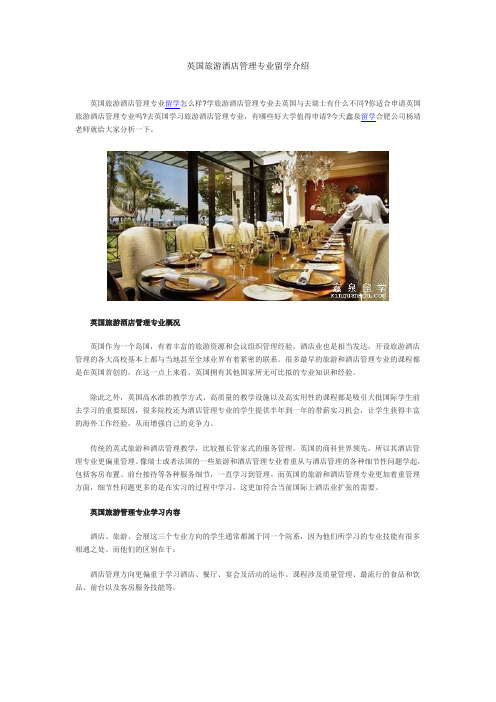
英国旅游酒店管理专业留学介绍英国旅游酒店管理专业留学怎么样?学旅游酒店管理专业去英国与去瑞士有什么不同?你适合申请英国旅游酒店管理专业吗?去英国学习旅游酒店管理专业,有哪些好大学值得申请?今天鑫泉留学合肥公司杨靖老师就给大家分析一下。
英国旅游酒店管理专业概况英国作为一个岛国,有着丰富的旅游资源和会议组织管理经验,酒店业也是相当发达,开设旅游酒店管理的各大高校基本上都与当地甚至全球业界有着紧密的联系。
很多最早的旅游和酒店管理专业的课程都是在英国首创的,在这一点上来看,英国拥有其他国家所无可比拟的专业知识和经验。
除此之外,英国高水准的教学方式、高质量的教学设施以及高实用性的课程都是吸引大批国际学生前去学习的重要原因,很多院校还为酒店管理专业的学生提供半年到一年的带薪实习机会,让学生获得丰富的海外工作经验,从而增强自己的竞争力。
传统的英式旅游和酒店管理教学,比较擅长管家式的服务管理。
英国的商科世界领先,所以其酒店管理专业更偏重管理。
像瑞士或者法国的一些旅游和酒店管理专业着重从与酒店管理的各种细节性问题学起,包括客房布置、前台接待等各种服务细节,一直学习到管理。
而英国的旅游和酒店管理专业更加着重管理方面,细节性问题更多的是在实习的过程中学习,这更加符合当前国际上酒店业扩张的需要。
英国旅游管理专业学习内容酒店、旅游、会展这三个专业方向的学生通常都属于同一个院系,因为他们所学习的专业技能有很多相通之处。
而他们的区别在于:酒店管理方向更偏重于学习酒店、餐厅、宴会及活动的运作。
课程涉及质量管理、最流行的食品和饮品、前台以及客房服务技能等。
会展管理方向的课程内容相对更加全面,包括:如何策划、宣传和执行一项活动;这里所说的活动形式会更加多样化,从小型婚礼到大型会议,或者诸如American super bowl(美国超级碗)之类的大型赛事都是要学习的内容。
旅游管理方向的学生将学习如何规划和统筹管理人们的出行,并思考人们的出行对经济、环境和社会所产生的影响。
旅游英语电子课件Unit 5Accommodation
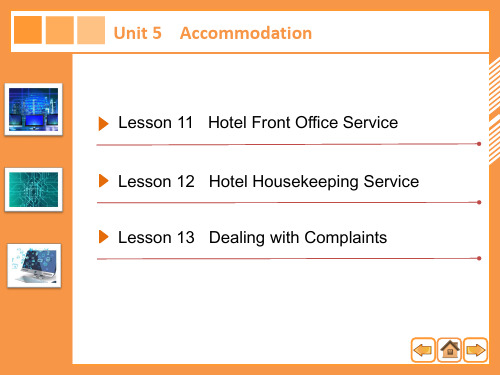
driver concierge clerk
front office manager bellman
reservation clerk reception clerk
front office manager
reservation clerk reception clerk
concierge clerk
Look and Learn Dialogue Reading Learn More New Words and Phrases
Unit 5
Lesson 5411
李峰是酒店的前厅接待员,他正在为导游Peter Black所带的 旅游团办理酒店入住手续。 Li Feng: All right, let me have a check. Yes, all are non-smoking rooms. Arrival date is December 1st, 2015 and departure date December 4th, 2015. Can I see your passports, please?
Look and Learn Dialogue Reading Learn More New Words and Phrases
Unit 5
Lesson 5411
李峰是酒店的前厅接待员,他正在为导游Peter Black所带的 旅游团办理酒店入住手续。 Li Feng: Of course. Your rooms are on the 15th floor. The bellman will take you to your rooms.
Look and Learn Dialogue Reading Learn More New Words and Phrases
- 1、下载文档前请自行甄别文档内容的完整性,平台不提供额外的编辑、内容补充、找答案等附加服务。
- 2、"仅部分预览"的文档,不可在线预览部分如存在完整性等问题,可反馈申请退款(可完整预览的文档不适用该条件!)。
- 3、如文档侵犯您的权益,请联系客服反馈,我们会尽快为您处理(人工客服工作时间:9:00-18:30)。
英国国际酒店与旅游管理课程中英文对照
课程英文名课程翻译中文名
Marketing 市场营销
Hospitality Concept and Innovations 酒店概念与创新
Dissertation 硕士毕业论文
Tourism Destination Management and Marketing 旅游目的地管理与市场营销
Major Event Policy and Practice 重要会展政策与应用Research Methods 研究方法
Leadership and Entrepreneurship 领导能力与企业家能力
Research and Consultancy Project 顾问设计与研究
Managing People 人员管理
Sector Industry Analysis 产业分析
以上课程有些都为提及旅游,但课程范围都在旅游范围内,例如:市场营销是专门针对旅游产业的市场营销,研究方法具体涉及旅游产业的研究方法等等。
荷兰旅游管理课程中英文对照
课程英文名
Concept Development Tourism & Leisure Industry A1 旅游与休闲管理产业概展A1 Concept Development Tourism & Leisure Industry A2 旅游与休闲管理产业概展A2 Concept Development Tourism & Leisure Industry A3 旅游与休闲管理产业概展A3 Introduction (IP)A 课程介绍
Strategic Management (IP) C 战略管理Strategic Management (IP) PR 战略管理Strategic Management (IP) Wr 战略管理
Thesis (IP) M 毕业论文M Thesis (IP) W1 毕业论文W1 Thesis (IP) W2 毕业论文W2 Workshop 1 (IP) C 课程研讨Workshop 1 (IP) W 课程研讨Workshop 1 (IP) W 课程研讨
我保证,以上课程均经过教育部的国外学历学位认证,真实准确。
如有不同虚假,愿付全部责任。
